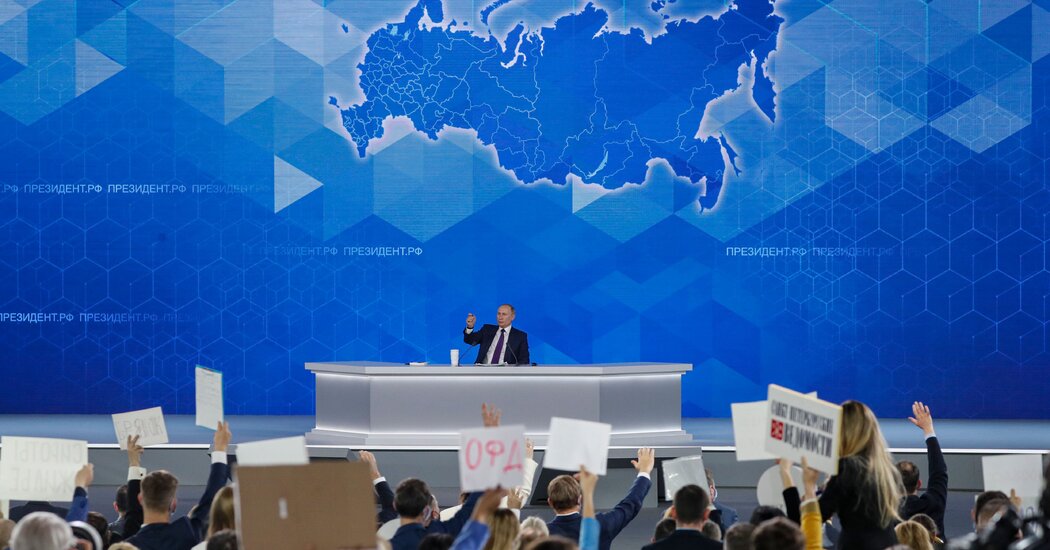The Russian president appears on camera almost daily, talking about things like cryptocurrency, green energy and the World’s Fair. But not about Ukraine.
MOSCOW — Amid all the fear and guesswork this month over the possibility that President Vladimir V. Putin could soon order an attack on Ukraine, one man has been conspicuously silent: Mr. Putin.
In November and December, Mr. Putin spoke out about Ukraine repeatedly, pairing Russia’s ominous military buildup with threatening rhetoric. At an end-of-the-year news conference on Dec. 23, Mr. Putin warned that Russia needed “guarantees” that Ukraine would never join the NATO alliance “right away, right now.”
That news conference, more than a month ago, was the last time that Mr. Putin spoke publicly about the current crisis over Ukraine, or about Russia’s demands that NATO roll back its presence in Eastern Europe. He has remained silent about it even as Russian and American diplomats sparred in Geneva, Ukraine received Western weapons deliveries and President Biden predicted Mr. Putin would mount an invasion.
It’s not as though Mr. Putin has been avoiding the limelight, however. He has done on-camera events almost daily — the sorts of carefully stage-managed meetings often used by Mr. Putin to signal his position on sensitive matters.
On Wednesday, Mr. Putin held a two-and-a-half-hour video conference with Italian executives about doing business in Russia. In his televised opening remarks, Mr. Putin discussed Moscow’s candidacy to host the Expo 2030 World’s Fair and spoke at length about green-energy investment opportunities. He said nothing about the war fears and sanctions threats that have the Russian economy hanging in the balance.
“We’re in a suspended state,” said Tatiana Stanovaya, a nonresident scholar at the Carnegie Moscow Center.
As with all things when it comes to Mr. Putin’s foreign policy, the president’s remarkable silence in a high-stakes drama that revolves around him appeared designed, in part, to keep the West guessing at his intentions.
It stood in contrast to the relentless speculation in Washington, where Mr. Biden has been asked repeatedly about, and rendered judgment on, the likelihood of a Russian invasion of Ukraine.
And it underscored the Kremlin’s discipline in controlling its message, with officials insisting that they would not make any decisions until the United States submitted a written response to Russia’s demands to halt the expansion of NATO. That response was delivered Wednesday evening in Moscow, with no immediate comment from the Kremlin.
“Let’s first get the response,” Dmitri S. Peskov, the Kremlin’s spokesman, said this week when asked about Russia’s stance. “Then the position will be formulated based on the conceptual guidelines provided by the head of state.”
Behind the scenes, in the Kremlin’s telling, Mr. Putin has been busy. In the last two weeks, Mr. Putin has spoken by phone with the leaders of Armenia, Azerbaijan, Cuba, Finland, Israel, Kazakhstan, Nicaragua, Pakistan, Uzbekistan and Venezuela. He hosted the president of Iran, Ebrahim Raisi, at the Kremlin.
But right now, it appears that the silence on Ukraine is the signal.
Ms. Stanovaya, who has studied Mr. Putin for years, said she saw three possible explanations for the president’s silence. Having laid out his hard-line stance demanding immediate concessions from the West late last year, Mr. Putin may see no point in repeating himself and is leaving the back-and-forth to his diplomats. It could also be that he sees a glimmer of hope for a possible deal and wants to avoid saying anything about it for the moment. Or he may have already decided on a military course of action and has been preparing to implement it while awaiting a formal response.
“We will still hear from him,” Ms. Stanovaya said of Mr. Putin.
Rather than publicly discuss Ukraine, Mr. Putin held a televised meeting on Wednesday with government officials in which he touched on cryptocurrency regulation and the pandemic. His videoconference earlier in the day with Italian business executives ran an hour longer than planned, according to Vincenzo Trani, president of the Italian-Russian Chamber of Commerce.
Understand the Escalating Tensions Over Ukraine
A brewing conflict. Antagonism between Ukraine and Russia has been simmering since 2014, when the Russian military crossed into Ukrainian territory, annexing Crimea and whipping up a rebellion in the east. A tenuous cease-fire was reached in 2015, but peace has been elusive.
The meeting was “very friendly,” Mr. Trani said. But there was no mention, even in the nontelevised portion of the meeting, of the big geopolitical issue of the day.
“On Ukraine, absolutely zero,” said Mr. Trani, who added that the only thing related to the tensions was when Mr. Putin’s answered Mr. Trani’s question about stability.
“I said we have a big need of stability,” Mr. Trani said, making it clear that he also meant stability in the region.
Mr. Putin, he said, responded, “I’m working to guarantee stability, not only macroeconomic, but also socially” for investors, which he said he understood was of great importance to entrepreneurs.
Other than that, Mr. Trani said, politics — either Russian or Italian — was not discussed at all. He added that when one Italian executive posed a question that had a tinge of Italian politics, one of the Russians in the meeting piped up: “We want to speak only of business.”
Anton Troianovski reported from Moscow, and Jason Horowitz from Rome.


























